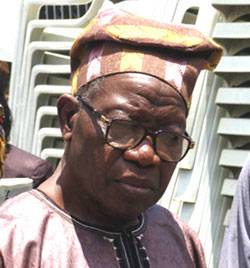BY: GODKNOWS IGALI
Few Nigerian statesmen have in the country’s history received the amount of adulation and accolades as ace journalist, Alhaji Lateef Jakande, who governed Lagos State, the country economic nerve centre from 1979 to 1983. Often known simply by his initials LKJ, this former Nigerian Minister of Works, unlike many other politicians whose life works are only eulogized posthumously, has become the veritable centre point of good governance and quintessence of public service. In his honour, the Nigerian Guild of Editors (NGE) commenced the maiden Annual Lecture Series on August 7, 2023.
HOW LIFE STARTED
- LKJ’s family and parental roots were traced to the town of Omu-Aran in present day Kwara State of Nigeria. Omu-Aran is the home of many great Nigerians including the first Kwara State Military Governor, Colonel David Bamigboye, as well as greatly acclaimed cleric, Bishop David Oyedipo of Living Faith Church, top diplomat, Ambassador Oluwole Idowu among others. Like many sons of the town, his parents moved to Lagos at the dawn of the century prior to his birth on 29th July 1929. He started his educational pursuit in various schools in Lagos and later at Bunham Memorial Methodist School, Port-Harcourt, 1934-1943, Kings College, Lagos, 1943 and Ilesha Grammar School in 1945 where he obtained his higher certificate. LKJ began his career in the world of writing during his higher secondary studies at Ilesha Grammar School where he was editing the school’s magazine titled “Quarterly Mirror”. Thereafter he continued improving himself in the newsroom in various media houses including running a publication known as “Daily Service”.
- In his media work, he became greatly fascinated by the larger than life profile and politics of Chief Obafemi Awolowo who founded the Action Group, a political party in 1951. By 1953, Jakande joined the “Nigerian Tribune Newspaper” which was established in 1949 by Chief Awolowo and became the visible mouth piece of the sage’s political structure and ideology. Gradually, he rose to become the Editor-in-Chief of this major national newspaper in 1956. It later became a life-long career of nearly 22 years of dutiful service to his mentor, Chief Awolowo during his high and low tides in politics. What upped his journalistic image was the fact that The Tribune newspaper under LKJ’s stewardship became popular for its very objective and fearless reportage. Despite the fact that for much of the time his political principal was in the opposition, he earned for the paper and for himself respect on the quality of his editorials. Till date, against the backdrop of the foundation which he laid, The Tribune is not only Nigeria’s oldest private newspaper in existence but has fledged on as the leading newsprint of preference in some sections of Nigeria.
- During his brief exit from the Tribune, he established a printing outfit, which came up with a new product “The Lagos News”. He also served at a time as the first President of Newspaper Proprietors Association of Nigeria (NPAN) and the Guild of Editors. LKJ was also credited a one of the brains behind the strengthening of Nigerian Union of Journalist (NUJ) and the establishment of Nigerian Institute of Journalism (NIJ) at Ogba in Ikeja, Lagos State.
FROM THE PEN TO AGBADA
- During the build-up stage to Nigeria’s return to civilian rule in 1979; a process that started in 1976 and subsequent formation of political movements that graduated into political parties, Jakande, who preferred the rather diminutive sobriquet of “Baba Kekere” which literally means a “little father” in deference to his boss “Baba” (Chief Awolowo), threw his net into the political waters. As expected, he teamed up with his boss, Chief Awolowo and his new political outfit, Unity Party of Nigeria (UPN). In the ensuing electoral process, LKJ won the UPN Governorship ticket for Lagos State, a platform through which he won Lagos Gubernatorial election in 1979 having defeated one of the country’s political juggernauts and pioneer lawyers at the time, Chief Adeniran Ogunsanya of the Nigerian Peoples Party (NPP) among others. A more spectacular score was his defeat of one of the “sons of the soil,” Prince Ladega Adeniji-Adele of the National Party of Nigeria (NPN), a descendant of the leading royal houses of Lagos. This was a big fit, underscoring not just the political influence of Chief Awolowo in that part of the country but called great attention to the candour of LKJ who did not have a great amount of formal tertiary education.
STERLING PERFORMANCE AND IMPACT
- Soon after his assumption in office, Alhaji Jakande moved to prove his mettle which remains unmatched in all of Nigeria’s history. His government pursued several policies particularly in areas such as free and affordable education, massive public housing and urban renewal. He introduced free and compulsory education both at the primary and secondary levels, for all the teeming population of Lagos irrespective of origin. Unfazed by a storm of bile and nay-saying from political opponents who groused and jeered over what they taunted as falling standards of public education, he built new schools and reconstructed existing ones using the cheapest technology. All relevant pedagogical materials were made available for free or at very affordable prices. By the time he left office in 1983, a total number of 22,000 classrooms had been added to the school system. He also increased the number of primary and secondary schools from 605 to 812 and 105 to over 223 respectively.
- With respect to tertiary education, he went on to establish, Lagos State College of Education and the Lagos State University (LASU) in 1983. With a population of about 34,000 students today, LASU has grown to be amongst the main universities in Nigeria. Aside from that, LASU has become a leading centre for research and innovation and was at several times amongst the ten best in Nigeria’s two hundred universities.
- In the area of Mass Housing, Jakande built about 30,000 units of houses around the state within a span of four years. He also flagged off the construction of the Onikan Stadium, now one of the country’s main recreational landmarks. In his own constituency, that is the world of mass media, Governor Jakande started both the Lagos State Radio and Lagos Television in 1980 and both media outfits are still making very remarkable impact in electronic broadcasting in Nigeria.
- Another area of great impact which he created was in public transportation. He opened up the entire state, especially Lagos metropolis, to affordable transport connectivity. This included marine transport services, taking advantage of the state’s riverine environment. Foreseeing the imminent population explosion in Lagos, which had maintained a steady growth rate of about 6.3% and heading into a megacity status, he started a “metro line” mass transport project. Although the city was the nation’s capital at the time, he did not wait for federal authorities, but went ahead to embark on this massive project. Sadly, since his exit for office, 40 years ago, the metro line was largely abandoned and the city continues to groan under the burden of great transport congestions.
THE SPECTACULAR NATIONAL FOOTPRINT
- Like most politicians of his time, from whom power was seized by the military, intermittently in Nigeria, in this case on December 31, 1983, he went back to private life for ten years but was recalled to serve as Federal Minister of Works (1993- 1995). This was under the tenure of military Head of State, Gen. Sani Abacha who ruled Nigeria from 1993-1998. Similar to other “progressive” politicians of his ilk, his acceptance to serve, which came under great pressure, became a blight on his later political career, as he lost much of his radical lustre and vitality. This notwithstanding, as a master builder, he brought his Midas touch to the national capital in overseeing the iconic Gwarimpa and Lugbe Federal Housing Projects, both in Abuja. These two gigantic public housing schemes are regarded as amongst the biggest of their type in Africa.
- He was not successful in his second foray into politics during the return of Nigeria to democratic rule in 1999, perhaps due to his erstwhile close relationship with Abacha. However, he later became a senior member of All Nigerian Peoples Party (ANPP). As the political processes kept evolving, he helped to form and became first Chairman of the Action Party of Nigeria (APN) in 2006. The political party did not however, make much impact in the political arena despite its contributions in politics and governance in the Second Republic.
CONCLUSION
- The life of this great Nigerian will be a perpetual reminder to all that “greatness lies not in ruling the people but in being the cause of greatness in their life”. As the servant-leader that he was, simplicity and humility were his mantra. Hence, throughout his tenure as a Governor of Nigeria’s largest and most sophisticated state, he lived in his personal house in a middle class municipality and drove down in his modest personal car. Hence even though LKJ is now counted as late and condemned to history, the impact of his life’s works continue to speak for him. He has corroborated American writer, James Dean’s metaphor of bridging the gap between life and death perpetually. So even in death, he still speaks with a clear voice to Nigeria and would, perhaps always do so.
- At a critical time in the country’s political evolution when the worth and value of true heroism remains evasive like a mirage, the life of such an outstanding character will no doubt be missed. However, the story of his life’s journey and the impact of his works, which we all see around, will continue to inspire succeeding generations of Nigerians to surpass his achievements.
Godknows Igali, PhD is a former Ambassador and retired Federal Permanent Secretary. Currently Alternate Chairman, Committee of Pro-Chancellors of Nigerian Universities, First Vice President, Academy of International Affairs of Nigeria. (Igalibuea@yahoo.com)



